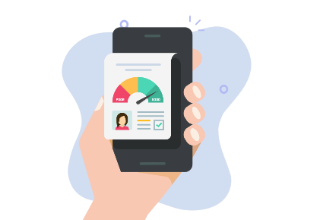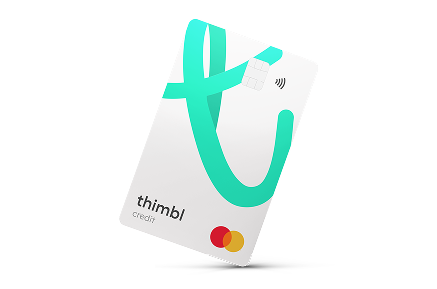What is a Good Credit Score in the UK?
Cara Bradley | October 22, 2024

What is a good credit score in the UK?
Whether it’s a credit card, personal loan, or mortgage, if you’ve ever thought about applying to borrow money, the chances are that you will have heard the term ‘credit score’.
thimbl provides the answers to some common questions, including what is a credit score; what’s a good credit score in the UK; and why is it important to have a good credit score?
Perhaps you’ve noticed that your credit score differs on various sites? We’ll also take a look into why this happens.
What is a credit score?
Your financial information, including your history of managing credit and paying certain bills, is reported by your lender or credit card provider to one of the three credit reference agencies (CRAs) in the UK. Over time, your activity will build up and provide an insight into your financial habits, which, in turn, will generate your credit score.
Your credit score will give potential lenders an indication of how you’ve managed borrowing in the past and how likely you are to be able to repay credit. The higher your score, the more ‘creditworthy’ you are considered. This could mean that you have a good chance of being eligible to apply for a credit product should you need to.
Where can I check my credit score?
You can check both your credit score and report with any of the three credit reference agencies:
*Please note that after an initial 30-day free trial period, Equifax charge a fee of £14.95 a month for their service. Experian and TransUnion are free to use.
What’s considered a good credit score?
Each credit reference agency uses a different scoring system - we’ll talk more about this later. As such, the definition of a ‘good’ credit score will vary between sites.
We’ve included the score brackets for each credit reference agency below.
| Credit Score | Credit Rating |
|---|---|
| 1121 - 1250 | Excellent |
| 1001 - 1120 | Very good |
| 861 - 1000 | Good |
| 641 - 860 | Fair |
| 0 - 640 | Low |
| Credit Score | Credit Rating |
|---|---|
| 811 - 1,000 | Excellent |
| 671 - 810 | Very good |
| 531 - 670 | Good |
| 439 - 530 | Fair |
| 0 - 438 | Poor |
| Credit Score | Credit Rating |
|---|---|
| 628 - 710 | Excellent |
| 604 - 627 | Good |
| 566 - 603 | Fair |
| 551 - 565 | Poor |
| 0 - 550 | Very poor |
Why is my credit rating different on different sites?
You may have noticed that your credit score can differ between Experian, Equifax, and TransUnion. This could be because each CRA uses a different scoring model when calculating your credit rating.
Additionally, the CRAs may receive your financial information from creditors at different times, meaning that one company may have more up-to-date and accurate information than another.
If something really doesn’t seem right with your score on one site, it might be a good idea to take a closer look into your credit report to make sure all the information showing is accurate.
Which score will providers and lenders use when considering my application for credit?
Each creditor will work with one of the three CRAs. The score they see will be the one that’s recorded with the CRA they work with. You may want to ask a lender or credit card provider which CRA they use before you make a full application for credit; you might be able to find this information in their Privacy Policy.
Why is it important to have a good credit score?
Having a good credit score could mean that you’re more likely to be accepted for credit, should you need to apply to borrow in the future. However, it’s important to remember that approval for any credit product will be subject to the individual lender or credit card provider’s specific eligibility criteria, affordability checks, and a hard credit search.
You may also find that a good credit score could mean you are eligible to apply for a product with a more competitive interest rate.
How can I improve my credit score?
- Register to vote.You may not associate voting with your credit score, but being on the electoral roll will make it easier for potential lenders to verify your information, including your current address.
- Check your credit report for errors. An outdated address on your credit report might not seem a big deal, but inaccuracies could cause a decline to your credit score. If you spot something that doesn’t look right, you should contact the credit reference agency.
- Make sure all your bills and any current credit commitments are paid on time. Late and missed repayments can seriously harm your credit score and put you at risk of additional fees and charges.
- If you have a credit card, stay well within your credit limit, and try to keep your credit utilisation as low as possible. Your credit limit is the maximum amount of money you’re able to spend and your credit utilisation is the percentage of available credit that you're using.
- Try to avoid using your credit card to withdraw money from a cash machine. This is known as a cash advance. Not only will you be charged a fee for this, but some credit card providers view this type of transaction as a sign of poor money management.
- Limit the number of hard searches you undergo. When you apply for credit directly with a credit card provider or lender, they will carry out a hard search as part of their affordability checks. Multiple hard searches within a short period of time could have a negative effect on your credit score.
- Be aware that having a joint account with someone who has a poor credit score could impact your own rating; this is called financial association.
- You might choose to do some research into credit builder credit cards. When used responsibly alongside the other credit boosting methods mentioned in this list, these credit cards could help you work towards a better credit position. Credit builder credit cards usually come with a low credit limit, which aims to support responsible spending. Use your credit card to make small purchases which can be repaid in full and be sure to make your repayments on time each month. Over time, you could notice an improvement in your credit score.
How long does it take to get a good credit score?
There is no set answer to this question. Everyone’s financial situations are unique and improving your credit score will depend on several factors, including your financial habits moving forwards.
You should also bear in mind that the latest information could take several weeks to be fed back to the CRAs. For example, if you took out a credit builder credit card with the intention of beginning your journey towards a healthier credit position, your spending and repayment history might not be reported to the CRAs for several weeks or even months.
You shouldn’t feel disheartened if you don’t see an improvement in your score straight away – credit-building takes time and patience, but it will certainly be worth it.
Do county court judgements (CCJs) and individual voluntary arrangements (IVAs) affect your credit score?
Yes. CCJs and IVAs will stay on your credit report for six years and are likely to have a harmful effect on your credit score during this time.
You could notice an improvement in your credit score once your CCJ or IVA has been removed from your file.
Worried about money?
If you’re worried about money, please know that you can find free, confidential advice through a number of charities and organisations, such as StepChange, MoneyHelper, Citizens Advice, and National Debtline.
The information contained in this article does not constitute advice and should not be viewed as such.
October 2024.
Did you find this article helpful?
Let us know how we can be more helpful
Please leave your anonymous feedback to help us keep improving.
About the author
1+ years financial experience








